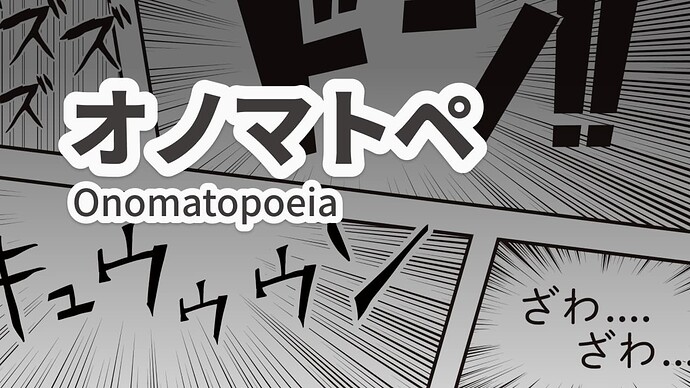Hi all!
As you may have guessed by this title, this is an announcement post about the onomatopoeia deck that we have just released here on Bunpro.  You can find the deck under the Non-JLPT category in our deck library. Click here to visit the deck page directly.
You can find the deck under the Non-JLPT category in our deck library. Click here to visit the deck page directly.
An onomatopoeia deck has been a long-standing request that we have had from users, and we feel that we finally have a big enough library of vocabulary that we could offer something that was quite comprehensive.
Okay, let’s get stuck into the meat of this post. 
 Making an Onomatopoeia Deck
Making an Onomatopoeia Deck 
As many of you would already know, onomatopoeia is one of the hardest areas of Japanese to study. This is primarly due to the vast range of combinations that really only differ in very small ways. However, native Japanese speakers usually don’t have any difficulty at all with these words, despite their vast numbers and similarities. The reason for this is something that is often overloooked when studying Japanese, but can be extremely helpful. This feature is called sound significance.
Sound significance?
Sound significance is exactly as the name states. The significance or ‘meaning’ of any sound. In Japanese, all sounds have a meaning. A very brief guide on the subject can be found here on Tofugu.
As a TLDR, here is an example. Which one of these sounds is more open, か or き? … か, right? How about which one is lower pitched, ち or こ? … that would be こ. This ‘feeling’ that sounds have is sound significance.
For our deck, we have chosen to start by introducing a set of very common onomatopoeia words, as well as some common animal sounds etc, before we dive directly into sound significance. A brief set of words then introduces all the sounds, and what they tend to signify. Sometimes direct translations of onomatopoeia to English can be quite poor, so we recommend using and attempting to memorize the very brief descriptions in the chapter headings to give you a better mental image of what each sound means.
As an example of the limitation of english, let’s pretend that a word is translated as ‘complete’. However, is it complete and solid? complete and brimming to the point of bursting? complete and precise or finely detailed? complete in terms of being all used up? If you learn the sound meanings, which type of ‘complete’ will become clear.
 Additional Onomatopoeia
Additional Onomatopoeia 
There is an almost ridiculous amount of onomatopoeia in Japanese. In our deck, we have included over 800, but we will continue to update the deck with any categories of words that we are currently missing, or with more examples of words that fit in already existing groups.
 Example Sentences
Example Sentences 
With onomatopoeia moreso than other types of words, it is absolutely essential to see many examples of how they are used to be able to truly understand what the underlying meanings or the ‘feelings’ of the words are when compared to similar words. That is why we have put the creation of example sentences for all entries in our onomatopoeia deck at top priority.
While many of the entries already have example sentences written by native speakers, we are going to endeavor to have a full set of example sentences for all entries within the deck within 2 weeks. This will be taking priority over our usual vocab sentence creation order, as we feel that the difficulty of the topic as a whole to students warrants it.
Enjoy! 
We hope that our approach to the topic and the creation of this deck will help you all get a solid grasp of onomatopoeia. We may continue to make slight adjustments to chapter titles etc over the coming weeks if we can think of descriptions that are easier to grasp or understand. Once you’ve mastered the topic, you’ll definitely have a lot more fun with Japanese as these funny little words start to really make the language spring to life! 
Thank you all again for encouraging us to create new and engaging material that break down the barriers to learning Japanese one by one. Hope everyone is having a fantastic week! 




 Then you have to decide whether that information is worth teaching, or better left in a thick ‘unlock onomatopoeia’ textbook
Then you have to decide whether that information is worth teaching, or better left in a thick ‘unlock onomatopoeia’ textbook 

